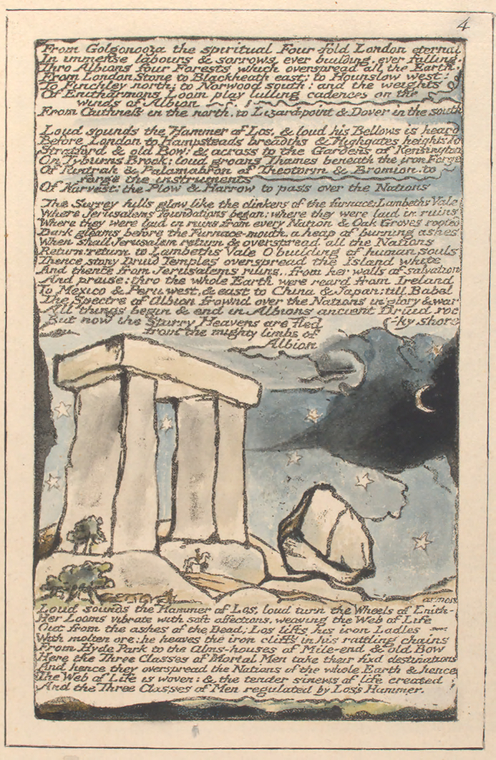These two principles are apparent to me in the writings of William Blake. He looks at realities as two-fold, three-fold or four-fold, but always as parts of the whole. Albion is the whole of Humanity; Eternity is the wholeness unlimited by time and space; the body of his work reveals the wholeness of his mythopaeic system. He demonstrates the interconnectedness of the portions of the whole by showing how activities in one sphere have consequences in all others. The concepts of forgiveness, recognizing error, cyclical processes, responding to catastrophic events, creating conditions for new processes to become apparent, brotherhood: are all manifestations of an interconnected system.
The apocalyptic thrust of Blake's work speaks to the ecological principal of succession. Blake's state of generation is for the purpose not of sustaining itself but providing the condition in which the Savior may appear. Eternity is to be the final status as well as the initial, but it will be the Eternity of Experience not of Innocence, arrived at only through creation, fall, regeneration and apocalypse .
Image
Milton, Plate 4
Milton, Plate 6, (E 100)
Image
Milton, Plate 4
Milton, Plate 6, (E 100)
"But now the Starry Heavens are fled from the mighty limbs of Albion
Loud sounds the Hammer of Los, loud turn the Wheels of Enitharmon
Her Looms vibrate with soft affections, weaving the Web of Life
Out from the ashes of the Dead; Los lifts his iron Ladles
With molten ore: he heaves the iron cliffs in his rattling chains
From Hyde Park to the Alms-houses of Mile-end & old Bow
Here the Three Classes of Mortal Men take their fixd destinations
And hence they overspread the Nations of the whole Earth & hence
The Web of Life is woven: & the tender sinews of life created
And the Three Classes of Men regulated by Los's hammer."
Loud sounds the Hammer of Los, loud turn the Wheels of Enitharmon
Her Looms vibrate with soft affections, weaving the Web of Life
Out from the ashes of the Dead; Los lifts his iron Ladles
With molten ore: he heaves the iron cliffs in his rattling chains
From Hyde Park to the Alms-houses of Mile-end & old Bow
Here the Three Classes of Mortal Men take their fixd destinations
And hence they overspread the Nations of the whole Earth & hence
The Web of Life is woven: & the tender sinews of life created
And the Three Classes of Men regulated by Los's hammer."

5 comments:
Also from Blake's Milton:
How red the sons and daughters of Luvah! here they tread the grapes
Laughing and shouting, drunk with odours; many fall o'er wearied;
Drowned in the wine is many a youth and maiden; those around
Lay them on skins of tigers, of the spotted leopard and the wild ass.
Till they revive, or bury them in cool grots, making lamentation.
This Winepress is called War on Earth; it is the printing-press
Of Los; there he lays his words in order above the mortal brain
As cogs are formed in a wheel to turn the cogs of the adverse wheel.
All kinds of insects, of roots and seed and creeping things—all the armies of disease visible or invisible are there:—
The slow slug; the grasshopper that sings and laughs and drinks
(Winter comes, he folds his slender bones without a murmur).
Wasp and hornet, toad and newt, spider and snake,—
They throw off their gorgeous raiment; they rejoice with loud jubilee
Around the winepresses of Luvah naked and drunk with wine.
There is the nettle that stings with soft down; and there
The indignant thistle whose bitterness is bred in his milk,
Who feeds on contempt of his neighbour; there all the idle weeds
That creep around the obscure places show their various limbs
Naked in all their beauty, dancing round the whiepresses.
But in the winepresses the human grapes sing not nor dance,
They howl and writhe in shoals of torment, in fierce flames consuming;
Tortured for the cruel joy and deadly sport of Luvah's sons and daughters;
They dance around the dying and they drink the howl and groan,
They catch the shrieks in cups of gold, they hand them one to another.
Thanks, Justin.
I will appreciate any quotes from Blake you would like to add.
Ellie
I really like these two "principles of ecology" as you articulate them, Larry.
Where you write "The apocryphal thrust of Blake's work..." do you mean apocalyptic rather than apocryphal? If apocryphal, can you say more?
As always, thanks!!
Thanks for the correction.
Ellie
oops. I see now the original post was Ellie's...
I just love this paragraph:
"The apocalyptic thrust of Blake's work speaks to the ecological principal of succession. Blake's state of generation is for the purpose not of sustaining itself but providing the condition in which the Savior may appear. Eternity is to be the final status as well as the initial, but it will be the Eternity of Experience not of Innocence, arrived at only through creation, fall, regeneration and apocalypse."
Post a Comment